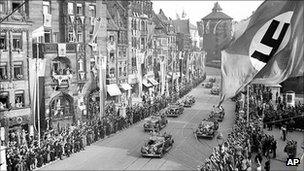Hugo Boss apology for Nazi past as book is published
- Published

The German fashion firm Hugo Boss has apologised for its maltreatment of forced workers during World War II when it supplied the Nazis with uniforms.
It issued the apology to coincide with the publication of a new history of the company during the Hitler years, which it commissioned itself.
Its factory used 140 Polish and 40 French forced workers.
The book concludes that company founder Hugo Boss, whose past is already well documented, was a loyal Nazi.
"It is clear that Hugo F Boss did not only join the party because it led to contracts for uniform production, but also because he was a follower of National Socialism," wrote the author, Roman Koester, an economic historian at the Bundeswehr (English: Federal Defence Force) University in Munich.
Both Mr Koester and the company insist that it had no influence over the contents of the book, although it provided the funding.
Brown shirts
Under the tile Hugo Boss, 1924-1945, the book recounts the history of the man who founded a clothes factory in Metzingen, Baden-Wuerttemberg in 1924.
One of his first big contracts was to supply brown shirts to the early Nazi party.
After the war Boss, who died in 1948, sought to argue that he had joined the party in order to save his company.
"That may have been the case, but one may not interpret Hugo F Boss' remarks to mean that he was personally far from National Socialism," said Mr Koester, his words quoted by The Local Germany news website.
"That was certainly not the case."
By 1938, the firm was producing army uniforms, and eventually it manufactured for the Waffen SS too - though it did not, apparently, design the SS uniform.
From April 1940, Hugo Boss was using forced labourers, mostly women.
A camp was built in the area of the factory to house the workers and, according to the abridged English version of Mr Koester's report, "hygiene levels and food supplies were extremely uncertain at times".
Mr Koester notes that Boss tried to improve conditions in 1944, a year before the war ended, by asking to house his workers himself, and attempting to improve their food situation.
"We can only repeat that the behaviour towards the forced labourers was at times harsh and involved coercion, but that concern for their welfare was also displayed, rendering simplistic characterisations impossible," he writes.
The company said on its website it wished to "express its profound regret to those who suffered harm or hardship at the factory run by Hugo Ferdinand Boss under National Socialist rule".
After the war Boss was tried and fined for his involvement in Nazi structures.
- Published25 August 2011